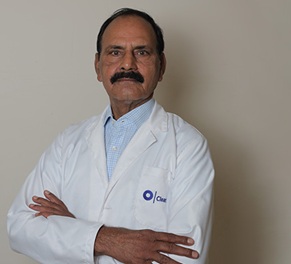Pilonidal Sinus Laser Surgery - Procedure, Benefits, Recovery
Dr. Saurabh Kumar Goyal

Treatment Duration
30 Minutes
------ To ------45 Minutes
Treatment Cost
₹ 40,000
------ To ------₹ 90,000

Table of Contents
- What is Pilonidal Sinus Laser Surgery
- Who needs Pilonidal Sinus Laser Surgery?
- Benefits of Pilonidal Sinus Laser Surgery
- Protocol Before and On the Day of Pilonidal Sinus Laser Surgery
- How is Pilonidal Sinus Laser Surgery Performed?
- Expectations after Pilonidal Sinus Laser Surgery
- Risks and Complications of Pilonidal Sinus Laser Surgery
- Risks of Delay in Pilonidal Sinus Laser Surgery
- Cost of Pilonidal Sinus Laser Surgery
- Takeaway
Laser Surgery for Pilonidal Sinus is an advanced method for treating pilonidal sinus. According to the research conducted by Zhicheng Li, every single case of pilonidal sinus was effectively treated using laser surgery. It resulted in a 100% success rate with only a 2.1% chance of recurrence.
The laser treatment for pilonidal sinus is a daycare procedure. Read on to get all your queries answered and learn about laser surgery for pilonidal sinus.
Procedure Name | Laser Surgery for Pilonidal Sinus |
Alternative Name | Laser Pilonidoplasty |
Conditions Treated | Acute and chronic pilonidal sinus |
Benefits of the Surgery | Less pain, No cuts or incisions, Fewer complications, Fast recovery |
Treated by | General Surgeon |
You can check Pilonidal Sinus Laser Surgery Cost here.
What is Pilonidal Sinus Laser Surgery
A pilonidal sinus is a small tunnel or tract in the skin near the tailbone, typically in the cleft between the buttocks. Our skin contains hair follicles, which are tiny openings where hair grows.
In the area near the tailbone, these hair follicles can sometimes become clogged with hair and debris. It can create a warm and moist environment under the skin, which is ideal for bacteria to thrive.
Bacteria can trigger an inflammatory response from the immune system. This causes the affected area to become red, swollen, and painful.
In some cases, the inflammation can lead to a pus-filled abscess beneath the skin. This abscess can continue to grow, causing more discomfort. Over time, as the abscess drains or is treated, a small tunnel or sinus may form beneath the surface of the skin.
This tunnel can become a recurring issue as hair and debris may continue to accumulate, causing inflammation, pain, and infection. In some cases, surgical intervention may be required to address the problem.

Laser treatment for pilonidal sinus is a minimally invasive method that effectively treats the condition. It utilises a laser to eliminate sinus tracts through several incisions.
This approach promotes quicker healing and lowers the chances of complications. Patients can resume normal activities shortly after the procedure. This makes laser treatment suitable for those preferring a less invasive option for pilonidal sinus treatment.
Pilonidal Sinus Laser Surgery Videos by HexaHealth
Expert Doctors (10)
NABH Accredited Hospitals (10)
Pilonidal Sinus Laser Surgery Success Stories


Who needs Pilonidal Sinus Laser Surgery?
Laser surgery for pilonidal sinus is a procedure to address both acute and chronic cases. A doctor recommends surgery when the pilonidal sinus is recurrent and becomes infected. The indications of pilonidal sinus laser surgery are:
- Pain or discomfort in the lower back or buttock cleft
- Swelling, redness, or a small lump in the tailbone area
- Drainage of pus or blood from an opening in the skin
- Soreness or tenderness in the affected region
- Formation of abscesses (painful, swollen pockets of infection)
- Recurrent infections in the same area

Benefits of Pilonidal Sinus Laser Surgery
Laser surgery for pilonidal sinus is a modern approach to treating this condition. It offers multiple advantages that can significantly enhance the quality of life. These benefits are:
- Minimal to no pain
- No need for incisions or stitches
- Reduced risk of bleeding
- Swift recovery
- The ability to return home on the same day
- Low cases of recurrence
- Decreased risk of infection

Protocol Before and On the Day of Pilonidal Sinus Laser Surgery
Patients often have concerns about what happens during the laser surgery. This section provides insight into the preparations before and on the day of the procedure.
Before Pilonidal Sinus Laser Surgery
Prior to laser treatment for pilonidal sinus, the medical team follows a set of protocols to guarantee the safety of the patient.
On the Day of Pilonidal Sinus Laser Surgery
The patient can expect to go through the following required preparations on the day of the surgery:
How is Pilonidal Sinus Laser Surgery Performed?
Laser pilonidal sinus surgery takes around 30 to 45 minutes. This procedure is carried out under local anaesthesia to ensure the patient's comfort. The procedure is performed by a general surgeon as below:
- Positioning: The patient lies on their abdomen with the head and feet lower than the middle portion. This position allows the surgeon to see the pilonidal sinus clearly.
- Anaesthesia: Regional or spinal anaesthesia is administered by an anesthesiologist to prevent any discomfort during the surgery.
- Incision: The surgeon makes a cross-shaped incision on the abscess, removing damaged tissue and identifying the sinus.
- Clearing the Sinus: The surgeon clears the sinus tract with iodine solution.
- Laser Treatment: Using a diode laser (8W with 1470 nm), the surgeon removes damaged tissue along the entire sinus tract.
- Fluid Drainage: After the laser treatment, the surgeon squeezes the tract to remove any fluid, flushing it with a saline and hydrogen peroxide solution.
- Sealing: The surgeon uses a fibre to seal the entire sinus tract.
- Dressing: The wound may be left open for drainage, or they may choose closed healing with instructions for using sanitary pads to absorb drainage.

Expectations after Pilonidal Sinus Laser Surgery
Most patients can go home on the same day as their surgery, but in certain situations, a hospital stay of 2 to 3 days may be necessary. On average, patients spend about 12 hours in the hospital after the surgery.
Recovery Process at Hospital
The patient is transferred to the recovery room for close monitoring, including vital signs and anaesthesia effects.
Below are the steps of the recovery process in the hospital:
- Immediate Post-Surgery Care: Depending on the complexity of the procedure, the patient may be placed in the ICU, a private room, or a general ward for further recovery.
- Pain Management and Infection Control: Pain is managed with prescribed medications to ensure comfort. Infection risk is closely monitored and treated if necessary.
- Mobility: Patients are encouraged to resume mobility as they feel comfortable gradually. Walking and light movement are beneficial for recovery.
- Discharge and Home Care: Follow provided home-care instructions, which may include wound care and medication schedules.

At-Home Recovery
The complete recovery time varies from person to person. Many individuals can expect to resume normal activities within a few weeks to a couple of months. Adhere to the doctor's guidance at home.
- Expect some pain and discomfort, managed with prescribed pain medications.
- Focus on wound care, including keeping the surgical area clean and changing dressings as instructed.
- Avoid strenuous exercises and demanding activities for approximately two weeks post-surgery.
- Make sure to:
- Get sufficient rest and sleep when tired.
- Refrain from sitting on hard surfaces until the incision is fully healed.
- Stay hydrated and choose low-fat foods like plain rice, broiled chicken, and yoghurt.
- Prevent constipation and straining during bowel movements.
- Steer clear of fried, spicy foods, alcohol, and smoking.
- Hold off on swimming or soaking baths for 2 to 3 weeks following the surgery.
- Avoid sexual intercourse for two weeks after laser surgery for the pilonidal sinus.

First Follow-up Appointment
The first follow-up appointment is typically scheduled 4 to 6 days after surgery. Compliance with follow-up visits is crucial for a successful recovery.
- During this follow-up visit, the doctor will check the surgical site.
- If necessary, the doctor may drain excess fluid from the cyst during the follow-up.
- Depending on the progress and how well the surgical area is healing, the doctor might adjust the medication.
Risks and Complications of Pilonidal Sinus Laser Surgery
Laser pilonidal sinus surgery is minimally invasive and has a quick recovery rate. However, as with any surgical procedure, some risks are associated. Some of the risks and complications associated with laser pilonidal sinus surgery are:
- Infection: There's a possibility of infection at the surgical site, which may require further treatment.
- Pain and Discomfort: Some level of pain and discomfort is common after surgery, but it's usually manageable with medications.
- Bleeding: While bleeding is rare, it can occur during or after the procedure and might need medical attention.
- Recurrence: In some cases, the pilonidal sinus can return, necessitating additional treatment.
- Numbness: Temporary or permanent numbness in the surgical area can occur due to nerve damage during the procedure.

When to See a Doctor?
The patient should get in touch with the doctor if they encounter any of the following issues:
- Pain
- Swelling or redness
- Signs of infection around the surgical area
- Bleeding
- Pus draining from the surgical site
Risks of Delay in Pilonidal Sinus Laser Surgery
When a pilonidal sinus isn't treated promptly, it can cause discomfort and disrupt daily life. Risks associated with postponing laser surgery for pilonidal sinus may involve:
- Worsening Symptoms: The existing condition in the pilonidal sinus can worsen, causing increased pain and discomfort.
- Abscess Formation: Delay may lead to painful abscesses, requiring more extensive treatment.
- Increased Discomfort: Waiting may result in more significant discomfort and inconvenience due to the persistent condition.
- Longer Recovery: The longer the surgery is postponed, the longer it may take for a patient to recover after the procedure.
- Potential for Complications: There is an increased risk of complications during and after surgery.
- Risk of Recurrence: Delayed treatment may raise the risk of the condition coming back in the future.

Cost of Pilonidal Sinus Laser Surgery
Laser pilonidal sinus surgery ranges from ₹ 40,000 to ₹ 90,000. Several key factors determine the cost. It includes:
- Consultation fee
- Diagnostic tests required for laser surgery
- Admission fees
- The type of hospital
- Choice of hospital recovery room
- Location or city of the hospital
Procedure | Cost |
Pilonidal Sinus Laser Surgery | ₹ 40,000 to ₹ 90,000 |
Takeaway
A pilonidal sinus can disrupt your daily life when it becomes infected.
If you experience severe pain and extreme discomfort, laser surgery for the pilonidal sinus can be an option.
For advice on the most suitable non-surgical and surgical treatments for pilonidal sinus, you can reach out to the experts at HexaHealth. We'll guide you from the initial assessment to post-surgery care.
Suggested Reads
Frequently Asked Questions (FAQ)
What is laser surgery for pilonidal sinus?
Laser surgery for pilonidal sinus is a modern approach to treating this condition. It involves using a laser beam to clear the cysts by eliminating pus.
Is laser treatment for pilonidal sinus more effective than traditional surgery?
Laser treatment for pilonidal sinus may offer some advantages, such as less pain and a quicker recovery. However, its effectiveness compared to traditional surgery depends on the specific case. It's essential to discuss with a healthcare professional to determine the most suitable treatment approach for your situation.
What are the advantages of laser surgery for pilonidal sinus over other treatments?
The advantages of laser treatment for pilonidal sinus over other treatments are:
- No need for incisions or stitches
- Minimal to no pain
- Reduced risk of bleeding
- Fast recovery
- Daycare procedure
- Low recurrence
- Decreased risk of infection
How long does it take to recover from pilonidal sinus laser surgery?
The laser is used to close the entire sinus tract, and patients can typically go home within 24 hours, resuming their regular activities by the 5th day. Complete wound healing usually takes 6-8 weeks, resulting in a quicker recovery.
Are there any alternative treatments to laser surgery for pilonidal sinus?
Yes, there are alternative treatments to laser surgery for pilonidal sinus, such as traditional surgical excision, incision and drainage, or non-surgical approaches like antibiotics and wound care. The treatment choice depends on the severity and specific circumstances of the condition.
How long does the pilonidal sinus surgery procedure typically last?
The duration of pilonidal sinus surgery typically lasts around 30 minutes to 45 minutes. It depends on the complexity of the case. Your surgeon can provide a more precise estimate based on your situation.
Does pilonidal sinus laser surgery leave scars?
Pilonidal sinus laser surgery may leave scars, but they are typically smaller and less noticeable than those from traditional surgery. The extent and appearance of the scars can vary from person to person.
How soon can I expect relief from symptoms after laser pilonidal sinus surgery?
Relief from symptoms after laser pilonidal sinus surgery can vary, but many patients experience improvement shortly after the procedure. You may notice reduced pain and discomfort within the first few days to weeks, with complete relief as you heal over time.
Can laser surgery effectively treat chronic or severe pilonidal sinus cases?
Laser surgery can be effective for chronic or severe pilonidal sinus cases. The success rate may vary depending on individual factors.
What is the success rate of laser surgery in preventing pilonidal sinus complications?
Laser surgery for pilonidal sinuses achieved a success rate of 87.5% and had a low recurrence rate of just 2.9%. It was accompanied by mild postoperative pain and minor wounds. The outcome depends on individual factors.
Can laser treatment be used for recurrent pilonidal sinus cases?
Laser treatment can be considered for recurrent pilonidal sinus cases, but its effectiveness may vary. Consult with a healthcare provider to discuss the best approach for your specific situation.
Is pilonidal sinus laser surgery suitable for all ages and gender?
Pilonidal sinus laser surgery is generally suitable for individuals of all ages and genders. Its effectiveness may vary depending on the specific case. Consult a doctor to determine if this treatment is the right option for your condition.
Is the duration of laser surgery for pilonidal sinus significantly shorter than traditional surgery?
Laser surgery for pilonidal sinus can be shorter in duration compared to traditional surgery. The exact time depends on the specific case.
Are there any potential complications associated with laser pilonidal sinus surgery?
Potential complications of laser pilonidal sinus surgery may include:
Infection at the surgical site.
Wound healing problems.
Pain or discomfort.
Scarring.
Recurrence of the sinus.
Bleeding.
Allergic reactions to anaesthesia or medications.
Nerve injury (rare but possible)
Does insurance cover the cost of laser pilonidal sinus treatment?
Yes, pilonidal sinus treatment is eligible for coverage by both mediclaim and health insurance plans. For a hassle-free and cashless process, get in touch with HexaHealth.
What questions should I ask my healthcare provider before laser surgery for the pilonidal sinus?
Some questions to ask your doctor before laser surgery for pilonidal sinus:
Can you explain the laser surgery procedure for the pilonidal sinus?
What are the potential risks and complications associated with this surgery?
How long will the procedure take, and will I need to stay in the hospital overnight?
What is the expected recovery time, and when can I return to normal activities, such as work and exercise?
Are there any specific pre-surgery preparations I should be aware of, such as dietary restrictions or medications to avoid?
Will I experience pain after the surgery, and how will it be managed?
What kind of scarring can I expect, and is there any way to minimize it?
How likely is it that the pilonidal sinus will recur after laser surgery?
What alternatives to laser surgery are available, and why is this method recommended for my case?
Is there anything specific I should do or avoid on the day of the surgery?
Are there any specific lifestyle changes or precautions I should take after the procedure?
Adhere to the guidance provided by your surgeon for wound care and follow-up appointments. Below are the precautions you may take:
Keep the surgical area clean and dry to prevent infection. You may need to take regular baths and change dressings as directed.
For a specified time, refrain from heavy lifting, vigorous exercise, and other physically demanding activities to promote healing.
Ensure a balanced diet with fibre to prevent constipation, as straining during bowel movements can be painful after the surgery.
Wear loose-fitting and breathable clothing to minimise friction and irritation around the surgical area.
Drink plenty of water to aid in the healing process and help prevent constipation.
What is the cost of laser pilonidal sinus surgery?
Laser pilonidal sinus surgery costs from ₹ 40,000 to ₹ 90,000. Several key factors determine the cost, like the hospital location, the type of hospital room selected for the recovery, etc.
More Treatment options
References
All the articles on HexaHealth are supported by verified medically-recognized sources such as; peer-reviewed academic research papers, research institutions, and medical journals. Our medical reviewers also check references of the articles to prioritize accuracy and relevance. Refer to our detailed editorial policy for more information.
- Li Z, Jin L, Gong T, Qin K, Cui C, Wang Z, Wu J. An effective and considerable treatment of pilonidal sinus disease by laser ablation. Lasers Med Sci. 2023 Mar 1;38(1):82. doi: 10.1007/s10103-023-03741-1. PMID: 36856904; PMCID: PMC9977879.

- Dönmez M, Uludag M. Evaluation of the Early Outcomes of Laser-Endoscopic Pilonidal Sinus Treatment Combination and Comparison With the Combination of Cautery-Phenol-Endoscopic Pilonidal Sinus Treatment. Cureus. 2022 Jul 17;14(7):e26948. doi: 10.7759/cureus.26948. PMID: 35989794; PMCID: PMC9378937.

- Kanlioz M, Ekici U. Complications During the Recovery Period After Pilonidal Sinus Surgery. Cureus. 2019 Apr 19;11(4):e4501. doi: 10.7759/cureus.4501. PMID: 31249763; PMCID: PMC6584172

- Mahmood F, Hussain A, Akingboye A. Pilonidal sinus disease: Review of current practice and prospects for endoscopic treatment. Ann Med Surg (Lond). 2020 Aug 1;57:212-217. doi: 10.1016/j.amsu.2020.07.050. PMID: 32793341; PMCID: PMC7415633.

- Kurt F, Sözen S, Kanat BH, Kutluer N, Sakalli O, Gençtürk M, Kanat Z. Effect of platelet-rich plasma on healing in laser pilonidoplasty for pilonidal sinus disease. Lasers Med Sci. 2021 Jul;36(5):1015-1021. doi: 10.1007/s10103-020-03137-5. Epub 2020 Aug 29. PMID: 32862404.

- NHS Choices. Pilonidal sinus [Internet]. 2020.

- Pastorino A, Tavarez MM. Incision and Drainage [Internet]. PubMed. Treasure Island (FL): StatPearls Publishing; 2020.

- Nixon AT, Garza RF. Pilonidal Cyst And Sinus [Internet]. PubMed. Treasure Island (FL): StatPearls Publishing; 2021.

Last Updated on: 23 November 2023
Reviewer

Dr. Saurabh Kumar Goyal
MBBS, MS General Surgery, FALS Bariatric and Metabolic Surgery, FIAGES Minimal Access Surgery
18 Years Experience
Dr Saurabh Kumar Goyal is a well-known General Surgeon, Laparoscopic Surgeon, Proctologist and Bariatric Surgeon currently associated with VNA Hospital. He has 18 years of experience in General Surgery, Laparoscopic Surgery and Proctolog...View More
Author

She has extensive experience in content and regulatory writing with reputed organisations like Sun Pharmaceuticals and Innodata. Skilled in SEO and passionate about creating informative and engaging medical conten...View More
Latest Health Articles






























